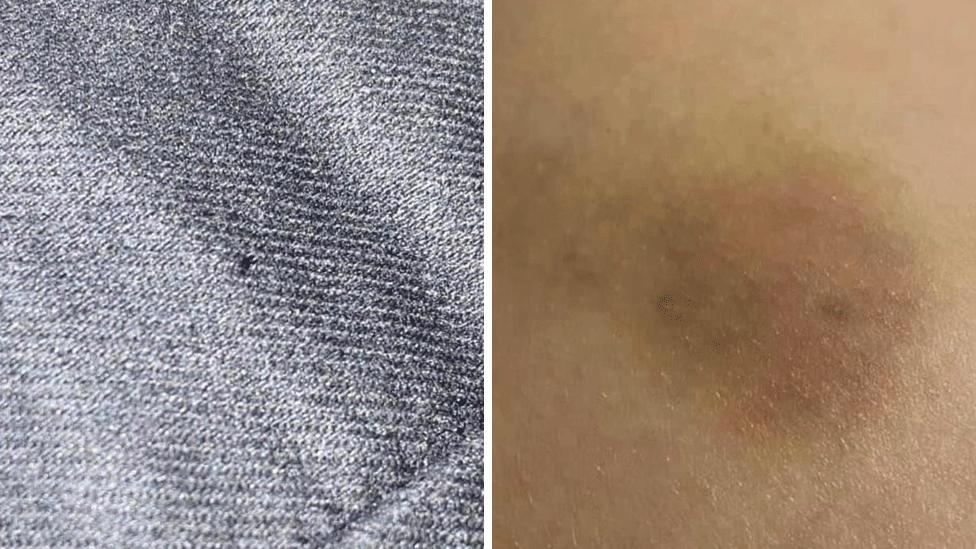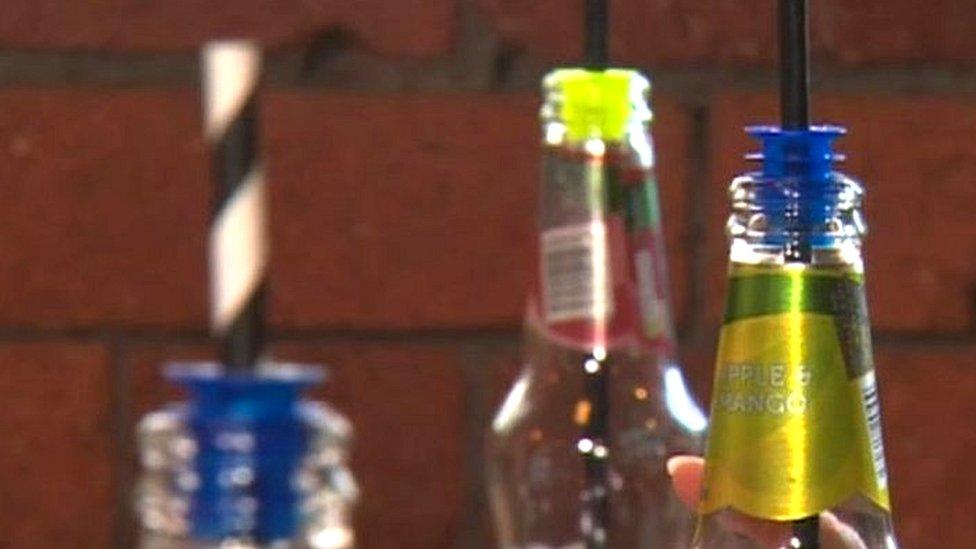Needle spiking: 'I'm losing out on my 20s and having fun'
- Published

Chloe Ward, 23, suddenly collapsed and was unconscious for about two hours while out with friends last year
It was during a night out with friends in the Suffolk town of Ipswich that Chloe Ward's speech became slurred and she passed out. She had been spiked by injection. A year on from the incident, with her attacker still at large, she remains too scared to go for a night out with friends.
"I feel like I'm losing out on living my 20s and having fun," the 23-year-old Ms Ward said. "It's been difficult."
She explained how during the first few months after she was spiked by injection she was too scared to go anywhere.
"Even going to a supermarket felt really scary because you can't trust people any more," said Ms Ward, of Trimley St Martin, near Felixstowe.
"I don't enjoy going out any more and it's sad to say that.
"Going out was my idea of having a really good night with friends, forgetting about everything, enjoying the time and making memories.
"It's hard because my friends still go out, but I don't want to, so I'm missing out."

The bruise

Ms Ward was pictured enjoying her night out in Ipswich before she was spiked
On the night she was needle spiked, Ms Ward had enjoyed a few drinks at a club before walking a short distance to another venue.
It was there that her speech became slurred, she could not hold herself up and then she collapsed.
She was taken to the club's medical room where her friends called 999 and an ambulance attended. She later regained consciousness and was taken home.
Ms Ward spent the next day - Sunday - asleep before waking during the evening to find her hip was sore from a circular bruise. When she checked her trousers, she found a small hole that corresponded to the location of the bruise.

Ms Ward said there was a pinprick-like hole in her trousers that corresponded with a bruise on her skin
On Monday morning she contacted her GP about what had happened, but was refused a blood test.
Ms Ward was initially reluctant to report what had happened to the police because she was concerned they would not take her seriously. After speaking with family and friends, she said, she realised she had to report the incident because of how serious it was.
Suffolk Police visited her to take her statement before returning on the Wednesday to take a urine sample.
She also contacted her doctor's surgery once more to demand a blood test, which was carried out the following day.

'The case has been closed'

Politicians say the problem of spiking will remain an "invisible crime" unless new measures are taken
Ms Ward is not alone in fearing the police might not take her report seriously.
A YouGov survey carried out this month found just 40% of people in the UK were "confident" they would be believed by the police if they reported having their drink spiked.
Suffolk Police said as well as collecting a sample four days after the spiking, it had reviewed "all CCTV available" and carried out various inquiries into the matter.
But the force said because "specific national guidelines" had not been met in Ms Ward's case, her urine sample was "not submitted for further analysis".
A spokesperson for the force said: "The case has been closed pending further lines of investigation coming to light.
"We ask that incidents are reported to both police and ambulance as early as possible so the necessary health and initial forensic enquires can be carried out."

How common is spiking?

Ms Ward said people needed to know the impact that being spiked had on individuals
Spiking, which involves having drugs or alcohol put in a drink without consent or being secretly injected, is a "largely under-reported crime", external, according to the government.
Between September 2021 and January 2022, 1,382 reports of needle spiking like Ms Ward's case were reported to police across the UK.
Last year, a YouGov survey found one in nine women said they had been the victim of drink spiking, external, while a third of women knew someone who had been targeted.
Establishing how many people have been prosecuted for spiking is difficult.
The Crown Prosecution Service said spiking data was not recorded because there was not yet a legal definition of "spiking".
Instead, such cases are prosecuted under a number of offences which involve administering substances to another without their consent.
They include:
Section 24 of the Offences Against the Person Act which makes it an offence to administer to a person "any poison or other destructive or noxious thing, with intent to injure, aggrieve, or annoy". This offence carries a maximum sentence of five years imprisonment.
Section 23 of the Offences Against the Person Act which makes it an offence to administer to a person "any poison or other destructive or noxious thing, so as thereby to endanger the life of such person, or so as thereby to inflict upon such person any grievous bodily harm". This carries a maximum sentence of 10 years imprisonment.
Section 61 of the Sexual Offences Act 2003 makes it an offence to administer a substance to a person without their consent with the intention of "stupefying or overpowering" that person so as to enable any other person to engage in sexual activity with them. This offence carries a maximum sentence of 10 years imprisonment.
The cross-party Home Affairs Committee, external warned spiking would remain an "invisible crime" unless more efforts were made to improve awareness and support victims.
It also found there was insufficient data surrounding spiking and said making it a specific criminal offence would help deter offenders and demonstrate it was being taken more seriously.
In response, the government said it would update Parliament in October, external as to whether spiking would be made a separate offence. This decision is currently delayed.
Ms Ward said she hoped that sharing her experiences would raise awareness of the problem.
She urged anybody who thinks they or a friend might have been spiked to get tested as soon as possible.
Ms Ward received three months of counselling, which was organised by police, and is continuing to regain control over her life.
"It is a big situation which can affect [not just] someone's physical health but also their mental health," said Ms Ward.
"My advice to anyone who's been in a similar situation is just push yourself slowly."
If you are affected by any of the issues in this article, help and support are available at BBC Action Line.

Find BBC News: East of England on Facebook, external, Instagram, external and Twitter, external. If you have a story suggestion email eastofenglandnews@bbc.co.uk, external
Related topics
- Published26 April 2022

- Published4 November 2021

- Published2 November 2021

- Published22 October 2021

- Published20 October 2021

- Published20 October 2021

- Published21 September 2021
